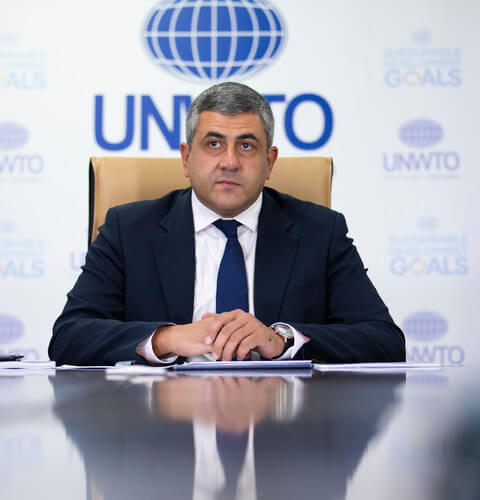- 15 Global Companies Launch Trusted Tech Alliance for Secure Digital Infrastructure
- Singapore Management University Launches Business AI Master’s Programme
- Cochin Shipyard Seeks Global Partners to Expand International Ship Repair Footprint
- OpenText Names Former IBM Americas President Ayman Antoun as CEO
- Fintech Company Network International Appoints Ashish Jain as Group CFO
Tag: Tourism
Zurab Pololikashvili has been Secretary-General of the World Tourism Organization (UNWTO) since January 2018. Prior to this, he worked in a number of high-level roles in both the private and public sectors. After graduating with a degree in banking, Mr. Pololikashvili gained extensive experience in the private sector, including a prominent role in one of Georgia’s biggest banks and as CEO of the country’s leading football team, FC Dinamo Tbilisi.
Zurab Pololikashvili’s career has been marked by an impressive range of achievements across both the private and public sectors. Armed with a degree in banking, he quickly rose through the ranks of one of Georgia’s biggest banks, serving in prominent roles such as Manager of International Operations for TBC Bank, Director of TBC Bank’s Central Branch Office from 2001-2005, and Vice President of TBC Group from 2010 to 2011. Not content with merely excelling in the financial world, Pololikashvili also served as CEO of the country’s leading football team, FC Dinamo Tbilisi, from 2001 to 2011.
Pololikashvili then transitioned to the public sector, serving as Deputy Minister of Foreign Affairs from 2005 to 2006. In this role, he supervised various departments and was responsible for ushering in a new phase of more liberal and secure visa regimes, as well as deepening relations with international organizations such as the UNWTO.
Due to his outstanding achievements, in 2006, Pololikashvili was appointed Ambassador Extraordinary and Plenipotentiary of Georgia to Spain, Andorra, Algeria, and Morocco. He also served as Permanent Representative of Georgia to the UNWTO up to December 2017.
Between 2009 and 2010, he was the Minister of Economic Development of Georgia, overseeing the country’s long-term fiscal growth strategies, advanced foreign trade and investment policy initiatives, and promoting the development of the tourism, infrastructure, and transportation sectors. As Minister, he launched an innovative policy for the development of tourism in Georgia, prioritizing the industry on both the government and private sector agendas. His reforms, marketing activities, improvement of infrastructure, and visa liberalization initiatives helped Georgia nearly double the number of international tourist arrivals from 1.5 million in 2009 to over 2.8 million by 2011. These reforms paved the way for sustainable tourism practices in Georgia and poverty alleviation initiatives, placing Georgia among the top tourism destinations in the region.
Pololikashvili’s exceptional accomplishments in the industry led to his election as the Secretary-General of UNWTO, the United Nations agency dedicated to promoting sustainable, responsible, and inclusive tourism, back in 2018. In this role, his leadership has been instrumental in advancing the organization’s key priorities, including jobs and education, tourism and rural development, and sustainability. At the 23rd General Assembly of the UNWTO, Member States unanimously approved his plan of action for global tourism, including the landmark Agenda for Africa and his focus on promoting tourism as a driver of gender equality, job creation, and rural development.
When the worldwide outbreak of COVID-19 brought the world to a standstill, and the tourism sector was the worst affected of all major economic sectors, the Secretary-General of UNWTO, Pololikashvili, took this crisis as an opportunity to rethink tourism development. He says, “Recovery must involve transforming the sector, re-inventing tourism destinations and businesses, rebuilding the tourism ecosystem, and innovating and investing in sustainable tourism.”
During the COVID-19 pandemic, Pololikashvili played a pivotal role in guiding the tourism sector’s response and recovery, winning political and practical support from governments and international organizations and uniting stakeholders around shared solutions and harmonized protocols. Under his leadership, UNWTO gained unprecedented visibility and prominence within the United Nations system, strengthening bonds with other key agencies and placing tourism at the heart of the broader recovery and sustainable development agenda.
Pololikashvili centered his efforts on supporting measures to restart tourism from both governments and the private sector through partnerships and agreements, with a special focus on innovation, education, and digitalization. Pololikashvili guided the sector, releasing recommendations for action and giving health advice to tourists. Moreover, as a UN agency specializing in tourism, UNWTO has released frequent travel restrictions reports and regular analysis of the COVID-19 impact on Tourism.
“The COVID-19 pandemic has had a devastating impact on the tourism industry, with a 60-80% decline in international tourism foreseen for 2020 and a drop of between US $910 billion and $1.2 trillion in exports,” said Pololikashvili.
According to the UNWTO, over 100 million direct tourism jobs were at risk due to the pandemic, disproportionately affecting women, young people, rural communities, indigenous peoples, and informal workers – groups that are more likely to be employed in micro or small tourism businesses. The crisis also created an even more significant hardship for low-income and developing economies and their local communities, which disproportionately depend on tourism and hence face a severe risk of higher poverty.
In response to this crisis, Pololikashvili said, “I take it upon myself to lead UNWTO with a strong focus on building partnerships, fostering jobs and opportunities for all, mastering technology and innovation, and advancing sustainability and the fight against climate change.”
Under his leadership, UNWTO convened the Global Tourism Crisis Committee (GTCC), gathering the heads of the tourism sector to prepare a unified global response to the crisis and a guide towards recovery by ensuring WHO that health measures are implemented in ways that minimize the disproportionate impact on international travel and trade; by standing in solidarity with the affected countries; and by emphasizing tourism’s proven resilience and by standing ready to support recovery.
The UNWTO-led Committee has held regular virtual meetings, reflecting the need for coordinated and efficient action by the private and public sectors, governments, international financing institutions, and the United Nations, with agencies such as the World Health Organization (WHO), the International Civil Aviation Organization (ICAO) and the International Maritime Organization (IMO); Among the private sector were representatives from IFEMA, the International Air Transport Association (IATA), Cruise Lines International Association (CLIA), the Airports Council International (ACI), and the World Travel & Tourism Council (WTTC).
“Tourism can – and indeed must – play a key role in turning ‘recover together, recover stronger’ into action. To be sure, ours was among the worst affected of all major economic sectors over the past two years,” said Pololikashvili. Despite the challenges faced by the tourism sector, he remains optimistic about its ability to bounce back and believes that its transformative power can benefit all.
According to Pololikashvili, travel is not only an excellent barometer of trust on a global scale, but it also has a unique ability to drive recovery and create opportunities. He says, “From political leaders to start-up businesses, the transformative power of tourism can benefit individuals and communities alike like never before.” He emphasized that the tourism industry’s potential to provide opportunities for all, regardless of social or economic background, is unparalleled.
Despite the harsh impact of the pandemic on the tourism industry, Pololikashvili firmly believes in its potential to bounce back and help shape a sustainable and inclusive future for all. He acknowledged the significant challenges faced by the industry, saying, “In 2020, the number of international tourists slumped down to levels last seen 30 years ago. G20 economies saw their tourism gross domestic product cut by half. And in two years, the world lost almost $4 trillion in direct tourism GDP and around 50 million tourism jobs.”
He adds, “However, the worst looks to be over. Tourism is restarting in many parts of the world. The United Nations World Tourism Organization’s data show that international arrival numbers for the first seven months of 2022 were three times higher than for 2021.”
Pololikashvili’s remarkable contributions to the tourism industry have not gone unnoticed, as evidenced by his re-election for a second term as Secretary-General of UNWTO during the 24th General Assembly in Madrid in 2021. His strong mandate to guide the restart of tourism and advance key priorities underscores his unwavering commitment to promoting tourism’s transformative power for the benefit of all.
In 2022, World Tourism Day was centered around the theme of ‘Rethinking Tourism.’ He says, “We made clear that now is the time to speed up and scale up our sector’s transformation. There is no time to waste. The UN Secretary-General, António Guterres, has warned us the global community is “moving backward.”
In his view, tourism must be rethought in every way, from its role as an employer and driver of opportunity to its economic and environmental impacts. Pololikashvili emphasizes the need for tourism to be seen as a solution to, rather than a cause of, the climate emergency. He says, “It needs to be addressed at every level:
As an employer
As a driver of opportunity
As an economic pillar
And as a solution to – not a cause of – the climate emergency. “
He continues, “Without a doubt, we have a big to-do list! Firstly, we need to rethink tourism as an employer. In every part of the world, our sector is a lifeline. It supports many millions of businesses and jobs. But we must make sure these are decent jobs! During the pandemic, we saw large numbers of workers leave tourism. Not all of them have returned.”
Moreover, he emphasizes the importance of tourism as a force of peace and understanding. He adds, ” We must continue to make tourism a force of peace and understanding. Just over one year ago, Russia invaded Ukraine. Tourism stood together in condemnation. Our Members swiftly voted to suspend Russia’s Membership in UNWTO. And our sector offered practical support for those affected – with flights, hotels, and more. I assure you that we will continue to work for peace. And we will ensure that when peace does return, tourism helps rebuild broken trust.”
He continues, “But while we have reason to be optimistic, we do not have cause to be complacent. As a global community, we are falling behind in our efforts to reach the climate action goals of the Paris Agreement. We are also behind in progress toward almost every single Sustainable Development Goal, most notably the vital goal of achieving gender equality and reducing poverty. Again, tourism can help get us back on track – only if we acknowledge that we cannot simply revert to pre-pandemic models. If our sector is to realize its unique potential to deliver positive change, we must speed up and scale up.”
Pololikashvili has also been focusing on the urgent need for climate action in the tourism industry. He highlights the Glasgow Declaration on Climate Action in Tourism, which has garnered almost 700 signatories in less than a year, including leading businesses and destinations, exemplifies the industry’s commitment to tackling the issue. Pololikashvili says, “But we need governments to also commit to big climate action ambitions if we are to make a real impact. This includes rethinking financing. Tourism can only deliver its benefits if governments deliver the support the sector needs – both financially and practically. And we need Ministers to make a case for tourism at the national level. Only a whole-of-government approach can deliver the scale and speed of transformation we need.”
As a leader in the tourism and hospitality industry, Pololikashvili’s dedication and contributions have been recognized by the International Hospitality Institute, which named him one of the 100 Most Powerful People in Global Hospitality in June 2022.
In his concluding remarks, Pololikashvili says, “Our sector gives them a chance to make a living, to earn not just a wage but also dignity and equality. Tourism jobs also empower people and provide a chance to have a stake in their societies – often for the first time.”
Gloria Guevara Manzo is an influential figure in the Mexican travel industry, having held various positions at Sabre Travel Network and Sabre Holdings before President Calderon was appointed Minister and...
Avi Meir is a seasoned professional in the travel industry, renowned for his expertise in the field. His extensive experience in the travel industry has earned him a reputation as a visionary leader and...










